- Editor's Choice
A comprehensive language app with an enormous library of practical & trendy topics.
- 2nd Choice
Excellent for focused conversational practice with a wide range of native speakers.
- 3rd Choice
A free app that is packed with thousands of useful phrases with accompanying audio.
So, you’ve decided to brush up on your Cantonese language skills, and you’re looking for the best apps to learn Cantonese. Firstly, congratulations! Cantonese is a beautiful language spoken by over 80 million people – that’s more than Korean or even Persian. It’s practically the main language spoken in Chinatowns across the world and is a hugely advantageous language for both business & commerce. So, you’re definitely onto a winner!
But how exactly can you manage your time and study most effectively? Which programs will get you to fluency the fastest? Luckily for you, there’s a whole host of mobile apps that’ll boost your Cantonese language skills, your range of vocabulary, and even your confidence in speaking. But finding the right ones can feel like searching for a needle in a haystack.
That’s why we’ve done that hard work for you and curated a list of only the very best language apps for learning Cantonese, based on their effectiveness, affordability & how comprehensive they are as an established language learning program.
So, without further ado, here are the 5 best apps for learning Cantonese!
Best Overall – Most Comprehensive
Coming in at number one on our list of best apps is CantoneseClass101, one of the most established language courses on the market, boasting a vast library of short video & podcast lessons, all bundled up into a well built app.
Unlike other courses, CantonesePod101 gives you, the user, full control over what you learn. You can search through the entire lesson library and filter based upon your level, skill type and interests. The lessons are then packaged up into learning ‘pathways’, guiding you through each lesson and learning exercise.

The lessons are fun and engaging, delivered by young and lively native speakers. They are constantly dropping in interesting cultural notes throughout each lesson and explaining the nuances behind each dialogue. Alongside the core syllabus you get a bunch of extra learning tools, from flashcards to grammar banks.
Overall, there’s really everything you need to progress in the Cantonese language. Plus, right now you can use our unique coupon code at checkout to get up to 77% off your subscription fee.
Pros
- Loads of content
- The lessons cover all skill types and a wide range of topics
- The app is really fun and easy to use
Cons
- There's too many explanations in English at the lower levels
- The lesson pathways don't always follow methodically on from one another
- Doesn't cover speaking
Price:
Effectiveness:
User Experience:
Best App for Conversational Speaking Practice & Cultural Exchange
Where would we be without italki? The number one go-to app for communicating with real native speakers. Oftentimes when we first start learning a language we quickly absorb new vocabulary & basic phrases very fast but soon forget them without having the opportunity to practice and thus engrain them into our long term memory.
This is mostly the case when learning a new language without living in the native country. Italki gives you the chance to practice everything you’ve learnt in a natural setting with a real native speaker, for a very affordable price – awesome!
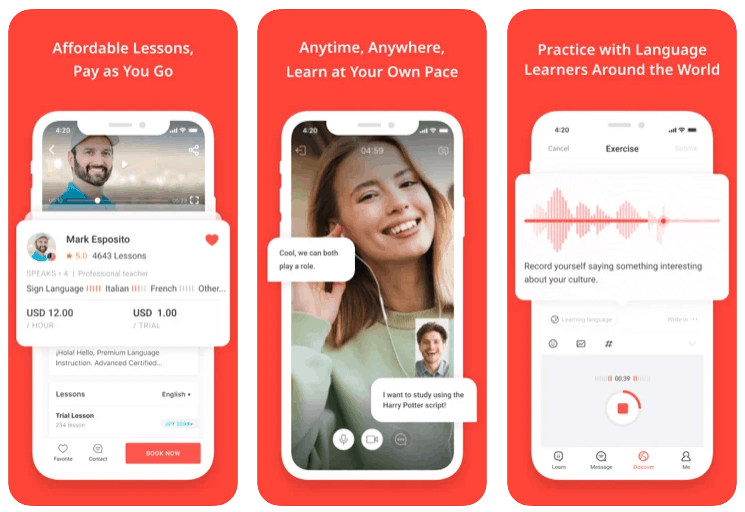
Pros
- Lessons can be booked for whenever is most convenient for you
- Huge number of available tutors
- Built-in learning platform
Cons
- It's down to you to set the intention & goals for each lesson
- Tutor quality varies
- It can take a while to find a tutor that fits to your learning style
Price:
Effectiveness:
User Experience:
Most Affordable Option
Believe it or not this app is completely free, paid for only by the ads that occasionally pop up which you are using it (which can be disabled by buying the pro version). The app is essentially a glorified phrasebook with thousands of phrases and vocabulary, each with their own audio files, recorded by native speakers in Hong Kong. You can split the learning down into manageable chunks by taking their quizzes & tests, or by using their premade flashcards.
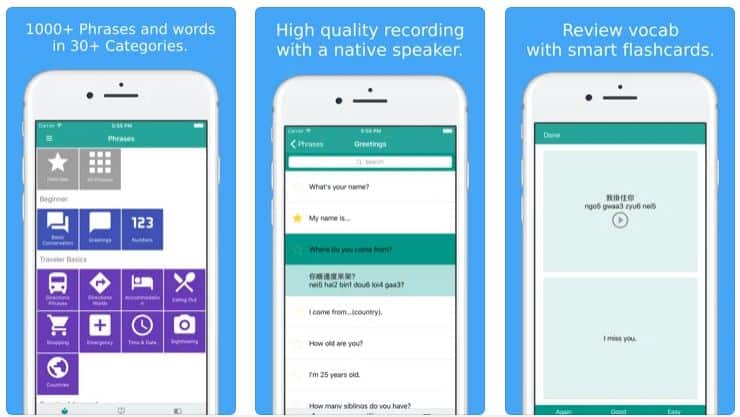
Pros
- Lots of useful phrases
- High quality audio recordings
- Uses spaced-repetition techniques for studying
Cons
- No structured lessons (only memorization of phrases & vocabulary)
- The ads can be too annoying at times, forcing you to get the paid version
- User interface could be nicer
Price:
Effectiveness:
User Experience:
Most Effective (for Conversational Cantonese)
Pimsleur has become something of a household name in the language learning industry, well-known for it’s research-based memory techniques and unique learning style. Whilst the enjoyability of the course is up for dispute, the method certainly works – many can testify. The method is purely audio based, broken down into 30-60 minute lessons that each use authentic dialogues and spaced repetition to get you recalling and producing language on demand.
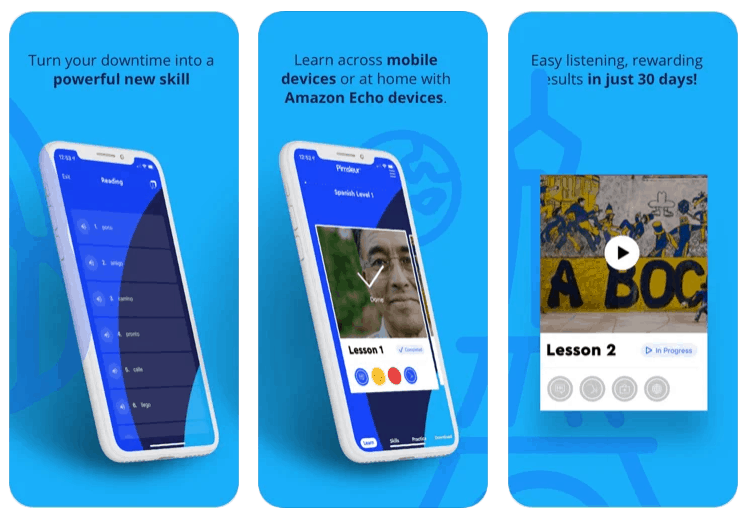
Pros
- Quick and effective method for becoming conversationally fluent fast
- 100% audio based
- The program has decades of refined research behind it
Cons
- It's expensive (each level is upwards of 100 dollars)
- No focus on reading or writing
- No clear explanations on grammar (everything is intuited)
Price:
Effectiveness:
User Experience:
Best App for Learning the Cantonese Writing System
Of course, for complete fluency in Cantonese you’ll need to get familiar with reading and writing the Cantonese script. Cantonese uses largely the same characters as Mandarin Chinese, however Cantonese mostly uses the traditional characters over simplified. For studying these characters, we reccomend the app Skritter. It’s generally everyone’s go-to app for learning Chinese and Japanese characters, with a very clever system of studying them.
First it’ll teach you the meaning, then it’ll sound it out with the correct tones, then it’ll teach you the stroke order and how to draw it. You’ll be identifying and writing thousands of new characters in no time!
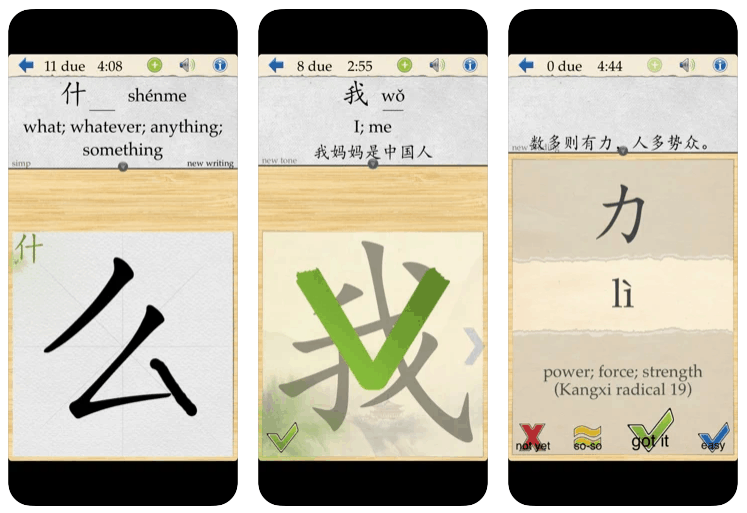
Pros
- The characters are neatly organised into themed decks
- SRS system makes it fun & efficient to memorise large amounts of characters
- Instant feedback on stroke order & writing, with prompts when needed
Cons
- Only covers Chinese & Japanese characters, no full sentences, grammar or speaking practice
- A bit pricey for what's essentially a glorified SRS flashcard deck
Price:
Effectiveness:
User Experience:
Runners-up for Best Cantonese App:
Looking for more? Well you’re in luck. Check out these apps that didn’t quite make it onto our top 5 list but still deserve a mention.
‘Learn Vietnamese in only 10 minutes per day with Master Ling’ the app website proudly proclaims… So is Ling a good option for learning Vietnamese? Well, it’s definitely got a lot going for it. The app, which can be downloaded for free, revolves around a set of dialogues grouped by topic. You can interactively select the correct answers and hear the audio played to you. Each lesson then concludes with a short quiz and the awarding of bonus points (or bananas).
Overall, it’s not a bad option as a free resource, but to unlock more than just a few lessons you’ll need to sign up for the pro version which is quite costly and the content doesn’t go much further than a basic beginner’s phrasebook.
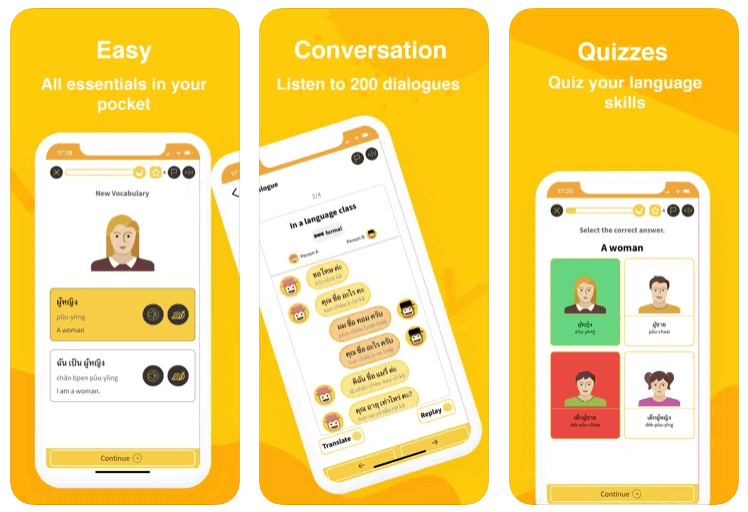
Pros
- Focused on realistic dialogues & everyday situations
- High quality audio
- Fun & engaging user interface
Cons
- Lacks in variety of learning methods and study tools
- Expensive for such a limited amount of content
- Relies too much on the romanization (not an effective method to learn the characters)
Price:
Effectiveness:
User Experience:
A solid dictionary app is essential when learning a new language, so you can quickly look up new words, save them & remember them for next time. For Cantonese, google translate just doesn’t cut it. Instead we recommend the app Pleco, an app that is predominantly focused on Mandarin but has awesome Cantonese capability too.
The app allows to you quickly look unknown words or phrases by using the live camera, importing documents, or even writing the characters with your finger. You’ll get an audio recording from two voices, pronunciation & grammar guide, and you can even save the new words to a flashcard deck of your choice.
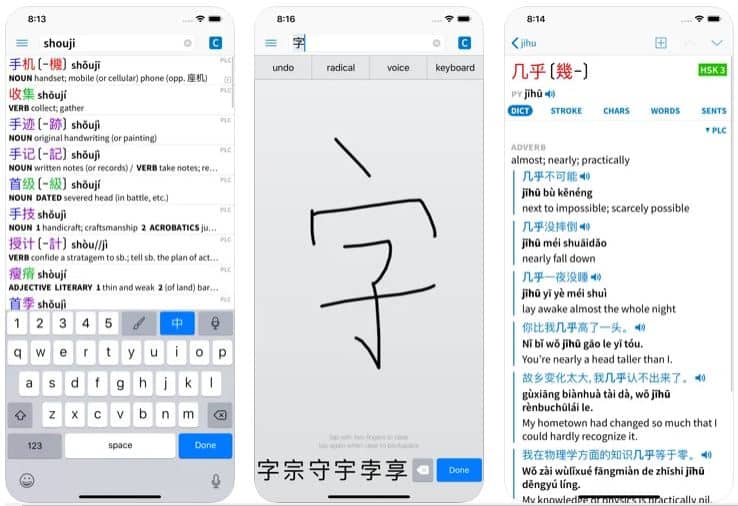
Pros
- It's very tolerant of handwriting errors like stroke order
- Quick and easy to use
- Animations teach you how to draw the characters correctly
Cons
- Quite expensive
- Some translations are now obsolete
- The pronunciation is not always correct
Price:
Effectiveness:
User Experience:
Memrise is a very popular app for learning a whole range of languages, and they’ve now added Cantonese to the mix. The lessons are short and varied, with lots of real-use dialogues with videos of native speakers. It’ll then test you on the words and phrases in a duolingo-like fashion. However, unlike Duolingo, Memrise teaches you useful phrases from the get-go, and is far more engaging.
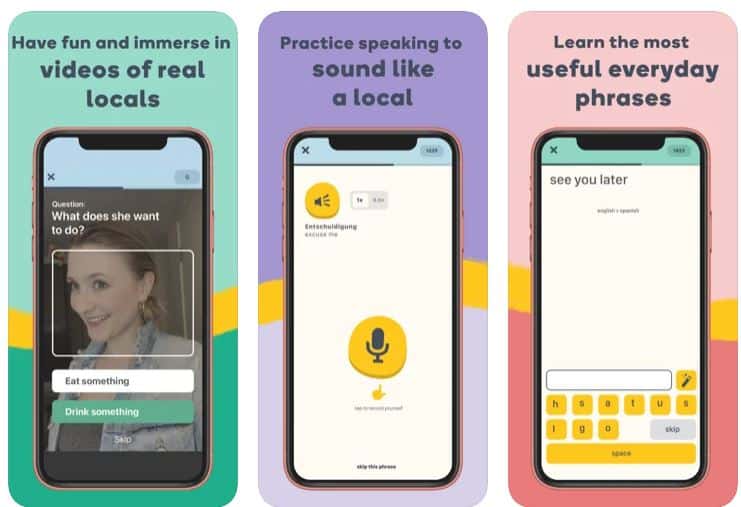
Pros
- Lots of courses to choose from
- The interface is very clean and fun to use
- Great videos of native speakers
Cons
- The courses are often made by other people so they may contain mistakes
- Quite expensive
Price:
Effectiveness:
User Experience:
Conclusion: The 5 Best Apps For Learning Cantonese
So there you have it. We hope this list has been of some use to you. Do bear in mind that there are many ways to learn a language, and no real ‘correct’ way to do so. For this reason, it’s important to try out lots of new apps and techniques and see what works best for you.
For studying Cantonese, we personally found that CantoneseClass101 was the best option for studying the language due to its sheer volume of high quality lessons and wide range of extra learning tools that are available. However, you may also want to supplement your learning with speaking practice on Italki, and develop your knowledge of the Cantonese writing system with Skritter.
And finally, we wish you the best of luck on your journey to Cantonese fluency. 你得嘅!(nei5 dak1 ge3, you can do it!)

Josiah is a digital nomad with a passion for language learning and adventure travel. He’s taught English as a foreign language for many years and is currently learning Georgian, French and Chinese.




